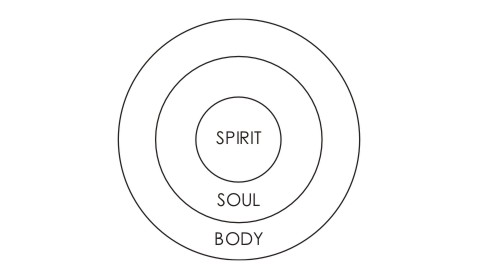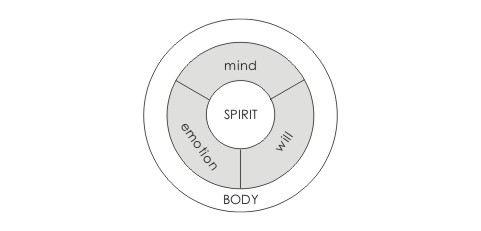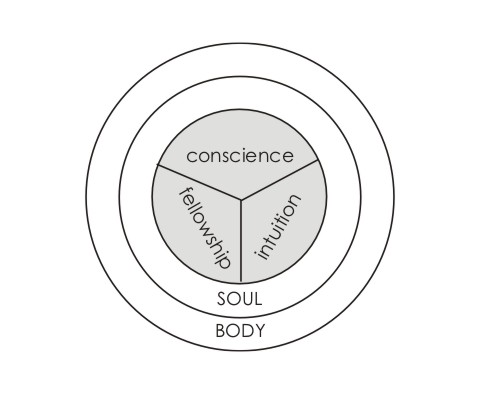Thank you GeneZ - that helps to clarify things.

As for the parts of man, there is some confusion on this thread:
Our conscience is our soul. Our soul wasn't reborn at conversion. What was reborn was our spirit.
The conscience is not the soul. Here is a quoted portion of a book called The Economy of God by Witness Lee that shows the parts of man very clearly:
THE THREE PARTS OF MANSPIRIT, SOUL, BODY
Some passages to which we will refer are very familiar. First Thessalonians 5:23 is a verse indicating that we are tripartite, or, of three parts: the spirit, the soul, and the body. We can illustrate this by three concentric circles:
Hebrews 4:12 also mentions the spirit and the soul, and the dividing of these two parts. If we would know Christ and enter into Him as the good land and as the rest, we must discern the spirit from the soul. The spirit is the very place where Christ dwells in us; so if we would know Christ in an experiential way, we must discern our human spirit from our soul. This verse mentions the difference not only between the spirit and the soul, but also between the joints and the marrow of the body and between the thoughts and the intents of the heart. The living Word of God is a discerner of all these things. This proves that if we are going to know the Lord in a practical and real way, we must discern all these parts. What are the thoughts of the heart and the intents of the heart? And how many parts are in the heart?
In Luke 1:46-47, the soul and the spirit are again distinguished.
Philippians 1:27 says that we must be of one spiritnot the Holy Spirit, but the human spiritand of one soul. (In the King James Version one soul is rendered one mind.) Again, this verse shows that there is a difference between the spirit and the soul.
Finally, Mark 12:30 says, And thou shalt love the Lord thy God with all thy heart, and with all thy soul, and with all thy mind, and with all thy strength. Here are four different parts: the heart, the soul, the mind, and the strength. If we put all these verses together we will realize that there are quite a number of different parts within us besides the many parts of the body.
First Thessalonians 5:23 indicates that we are spirit, soul and body, and Psalm 51 reveals the inward parts with the hidden part. The inward parts are the parts of the soul, which is proved by comparing Hebrews 8:10 with Jeremiah 31:33, where the mind is quoted as a variation of the inward parts. Just as the inward parts must be the parts of the soul, so the hidden part must be the spirit. Of all our parts, the spirit is the most hidden one within us. This inmost part is not only hidden within the body, but is even hidden within the soul. Hence, there are the
outward parts of the body, the
inward parts of the soul, and the
hidden part of the spirit.
THE THREE PARTS OF THE SOUL
MIND, WILL, EMOTION
There are three parts to the soul and three parts to the spirit. We must discover what are the three parts of both the soul and the spirit. Furthermore, we must also define the heart. First Thessalonians 5:23 indicates that we are a tripartite beingspirit, soul, and bodybut it does not mention the heart. What is the heart and how can we relate it with the inward parts and the hidden part?
Gods Word proves clearly and definitely that the soul is of three partsthe mind, the will, and the emotion. The shaded area in the diagram below illustrates the parts of the soul.
Proverbs 2:10 suggests that the soul needs
knowledge. Note also Proverbs 19:2 and 24:14. Since knowledge is a function of the mind, this proves that the mind is a part of the soul. All three of these verses from Proverbs tell us that we need to have knowledge in the soul. Then Psalm 139:14 says the soul
knows. To know is something of the mind, which again proves that the mind is a part of the soul. Psalm 13:2 says the soul
considers, or
counsels, which refers to the mind. Lamentations 3:20 indicates that
remembrance is of the soul. That is, the soul can remember things. From these verses we can see that there is a part in the soul that knows, considers, and remembers. This part is called the mind.
The second part of the soul is the will. Job 7:15 says the soul
chooses. To choose something is a decision made by the act of the will. This proves that the will must be a part of the soul. Job 6:7 says the soul
refuses. To choose and refuse are both functions of the will. First Chronicles 22:19 says, set your soul to
seek. Just as we set our minds to think, so we set our souls to seek. This is, of course, the soul making a decision, which proves that the will must be a part of the soul. Then in Numbers 30,
bind his soul is mentioned ten times. When we read this chapter, we understand that to bind the soul is to make a decision. It deals with a vow that is made with the Lord. To make a decision to bind the soul is to make a vow to the Lord. Thus, it is proven that the will must be a part of the soul. Psalm 27:12, 41:2, and Ezekiel 16:27 translate the Hebrew word soul into
will. The prayer made by the Psalmist is, Do not deliver me to the will of the enemy. In the original it means, Do not deliver me to the soul of the enemy. This proves clearly that the will must be a part of the soul.
The emotion is the third part of the soul. With the emotion there are many aspects: for example, love, hatred, joy, grief, etc. All of these are expressions of the emotion. References to
love are found in 1 Samuel 18:1, Song of Solomon 1:7, and Psalm 42:1. These verses show that love is something in the soul, proving, therefore, that within the soul there is such an organ or function as the emotion. Concerning
hatred, note 2 Samuel 5:8, Psalm 107:18, and Ezekiel 36:5. These passages indicate that hatred is something of the soul. Since hatred is an expression of the emotion, these verses also prove that the emotion must be a part of the soul. Ezekiel 36:5 is better translated in the American Standard Version, where the term despite of soul is used. It means the dislike or hatred of the soul.
Joy, an element of the emotion, is also a part of the soul, as seen in Isaiah 61:10 and Psalm 86:4, again proving that emotion is a part of the soul. Then there is the matter of
grief, mentioned in 1 Samuel 30:6 and Judges 10:16. Grief is another expression of the soul. Another aspect is
desire: 1 Samuel 20:4, Deuteronomy 14:26, Ezekiel 24:25, and Jeremiah 44:14. As to Ezekiel 24:25 and Jeremiah 44:14, the right meaning is reached when the American Standard Version is checked with the Youngs or Strongs Concordance. Desire, an element of the emotion, is shown by these verses to be in the realm of the soul.
These verses establish the ground to verify the three parts in the soul: the mind, the will, and the emotion. In the Scriptures it is difficult to find any additional parts of the soul, for these three parts cover all the functions of the soul. The mind is the leading part, followed by the will and the emotion. These are the verses which best reveal what are the three parts of the soul.






